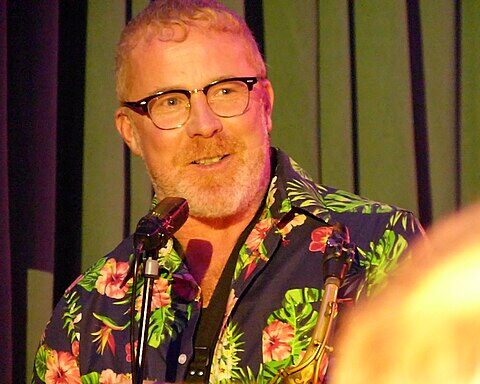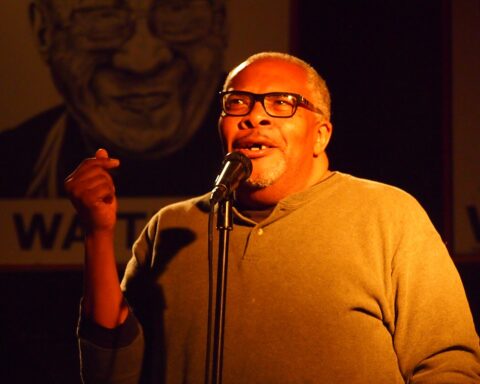The Jazz Educators Network (JEN) Conference, held May 20-22 in St. Louis, has come and gone but the two-week “postgame” window now allows enough distance for some reflection. Approximately 1,100 people — predominantly educators, with some musicians and industry people mixed in — attended the three-day affair. While there were only a few artist representatives and fewer presenters on hand, there is little doubt having such a gathering — the first such all-jazz “service organization”-driven conception since the demise of IAJE two years ago — was welcomed by all.
“The number of people who simply came up to me and said, ‘Thank You,’ has been amazing,” said Mary Jo Papich, JEN’s first president, who will turn over the reins to fellow co-founding member, bassist Lou Fischer on July 1.
Papich says attendance far exceeded expectations, noting that initially the organization hoped for 500 people and then maybe 1,000 once it became obvious that more people were pre-registered. The general vibe was that everything wasn’t perfect, yet it was a great first attempt to rekindle a universal jazz-educator spirit.
Though officially billed as the “Inaugural JEN Conference,” some referred to the St. Louis gathering as a “prequel” to what was the original plan: to have the JEN Conference launch January 6-8, 2011, in New Orleans. As it turns out JEN is moving forward with that conference and has begun to put information up on its website — http://www.jazzednet.org.
Whether the still newish but ambitious entity can pull off two gatherings in a roughly six-month period remains to be seen. If so, it will surely provide people with evidence of JEN’s staying power and its ability to increase its membership as well as give people the sense that the organization can successfully avoid some of the key pitfalls that brought down IAJE.
As leadership likes to point out, board members, musicians and others paid their own way to this conference. Most musicians and others donated their time — yours truly included as a panel participant (“Marketing Jazz in the 21st Century”), sharing the limelight with moderator Gary Armstrong, along with fellow panelists Terri Pontremoli, Executive Director of the Detroit Jazz Festival, and Dawn DeBlaze, a JJA member whose company, DeBlaze and Associates, provided advance PR for the conference.
Still, as giddy as many felt here, at least one concern — or “challenge” as Papich prefers to label any difficulty — seemed to slip under the radar. It is worth noting, even at this advance date, that the multi-disciplined Association of Performing Arts Presenters (APAP), which produces the country’s largest booking conference, has its next gathering January 7-11, 2011, in New York. Clearly the dates overlap with JEN’s proposed timetable. The situation is further complicated in that APAP has announced its “Jazz Track,” a series of jazz-related activities running throughout its conference which began in earnest last January, will continue in 2011. Having the two conferences conflict means that some jazzers will have to make a choice. Certainly those who represent artists — managers, agencies, etc. — who look at APAP, which attracts thousands of presenters as a potential earnings pool, will head to the Big Apple rather than the Big Easy. I have to admit that I myself am torn, as I suspect a number of JJA members will be. Papich even said that she would like to see the JJA become a JEN participant.
Interestingly, those currently part of JEN feel even with the first two conferences taking place within a half-year, and even with APAP going on at the same time, JEN-New Orleans will be successful. Papich isn’t overly concerned. (In an ironic twist, she was in line to become not only the first female IAJE president but also “the first president who worked at the high school [level] when she was elected.”) Her take is that those who attended in St. Louis and don’t make it to New Orleans for one reason or another will have their spots taken up by others who missed the first event. “There are a lot of [interested] people in that area.” Whether the current BP oil disaster has a lasting impact half a year from now is a developing sidebar.
Rufus Reid, whose trio Out Front headlined one of the three evening concerts here, says he believes getting on the January “conference cycle,” when more educators can make it in between semesters, is primary to JEN’s success.
Ditto fellow bassist John Clayton, who has emerged as a JEN protagonist. He, too, headlined an evening concert working with brother Jeff Clayton as co-leader of the Clayton Brothers Quintet. Like Reid, Clayton also participated on a second nighttime occasion as a member of the JEN all-star aggregate that included Bob Mintzer, Terell Stafford, Shelly Berg, Ndugu Chancler, Bill Mays and Marvin Stamm, among others. Clayton, a board member, was one of the many involved who felt strongly that it was important to hold the second event in January 2011, rather than wait a full 18 months.
The University of Missouri-St. Louis (UMSL) provided just what the doctor ordered: spacious surroundings including 350-seat and 1,600-seat venues readily available during the convention’s three-day run; a myriad of classrooms that could be used as clinic/workshop/panel locations; and, a multilevel student union that could serve as a make-shift exhibition hall; everything was within short walking distance of each other. Three relatively nearby hotels located within regular shuttle distance to the conference epicenter also minimized logistic hoops.
While the cumulative level and pace of the conference’s overall activity was mellow compared to IAJE conferences in their heyday, the overall flavor was similar. For instance, among the topic- and issue-based panel discussions were: “Achieving Success in Your College Interview,” which featured Victor Goines, David Baker, Clayton and Stafford as panelists; and “Management for the Self-Managed and Emerging Artist,” with Karen Kennedy (clients include Kenny Barron and others*) and trumpeter Orbert Davis as panelists. Gail Boyd, who manages the Claytons and their offshoot projects as well as Don Braden and others, served as moderator. Another discussion was titled “Artists, Teachers, Students and Fans: Develop and Connect to Your Jazz Audience through Social Media,” which included Erika Floereska, Director of Education at Jazz at Lincoln Center, as a panelist.
Throughout the three-day affair different high school and college/university bands performed 50-minute sets with the pros serving as special guests; there were pro-performance sessions and a conference-sanctioned late-night jam at the Airport Hilton, one of the key hotels. Beyond that there was the emotional “Welcome” plenary session, where Papich and others recalled how the JEN organizational and conference seeds were planted when a small group of organizers came together in Chicago some 18 months months earlier to draft bylaws, come up with a mission statement and plan the conference.
“We took the best of IAJE — with a variety of programs and [held] evening concerts,” said Papich. But JEN, which at press time has no paid staff outside of a contracted part-time web site person, must differ philosophically from IAJE in order to be successful: [“Our intention] is to be inclusive not exclusive, and be a member-driven, member-led organization.”
*Note: An earlier version of this piece incorrectly stated that Karen Kennedy manages Regina Carter. Carter is in fact managed by Darryl Pitt, Depth of Field Management.





This is a terrific recap by Jon Poses!! Having pulled off the first JEN Conference in six months, there's no doubt in my mind the group can do the same in January 2011. There were so many who took the "wait and see" attitude. These same folks have personally told me they definitely plan to attend the New Orleans conference. NOTE: 1,350 is the latest attendance figure I heard for the May 2010 conference.